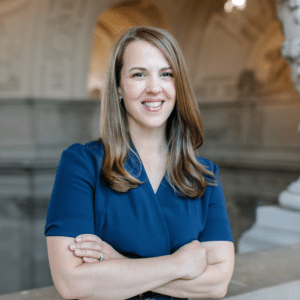
By ProFellow Founder, Dr. Vicki Johnson
For the first 15 years of my career, I worked in public policy in the field of public health preparedness, and I moved progressively higher in my career while working in Washington, DC. I completed my Master of Science in Public Health and my PhD in Emergency Management, but I pursued these degrees at different points in my career and for very different reasons.
I completed my Master’s in my early career (5 years after undergrad) so I could be eligible for higher-level senior analyst roles that required a graduate degree. I paid for my MSc through student loans because I felt it was the right investment given my very specific career goals (but also because I didn’t know where to look for funding!). Although it took me many years to pay off my student debt, I was immediately able to land a senior analyst position when I graduated, and within 3 years, my annual salary doubled from what it was before my master’s degree. Overall, I consider that degree to have been a worthwhile investment – I loved my career track and the opportunities that came with it.
Later, in my mid-30s, I had the opportunity to complete my PhD debt-free. While in New Zealand on 7-month Fulbright award, a professor at Massey University encouraged me to apply to the PhD program there and offered me “full funding” if I gained acceptance. The funding offer – a multi-year grant of full tuition coverage and an annual stipend – is what inspired me to consider pursuing this doctoral degree at a point in my career when I didn’t really need one. The funded PhD opportunity allowed me to advance some of the research I was already doing AND allowed me to continue my international adventure in New Zealand. The thing is, I didn’t need the degree to continue working in policy – I already had the network and skills to advance in my career. Instead, my PhD became an exciting chapter in my career adventure because it was funded.
So, here’s what you should ask yourself when pursuing a graduate degree that may or may not be a huge financial investment.
#1 Do I absolutely need this degree to advance in my career track?
Really take the time to get truthful answers to this question, because you might be surprised that the answer is no. Many people can move up in their career track purely through work experience, leadership opportunities and the cultivation of their professional network. Identify leaders in your career field who are 5-10 years ahead of you and see if they have a graduate degree. For those that don’t, ask them how they got there. And for those that do, ask them if they feel the degree was necessary!
If you confirm you NEED a degree to achieve your goals, or the degree can help you achieve your goals more quickly, then it can be a worthwhile investment. For example, to become a physician, you need a Doctor of Medicine (MD). To become a lawyer, you need a Juris Doctorate (JD). For some technical, advanced (and typically high-paid) career tracks, a graduate degree can be a must. However, for other career tracks, it’s debatable whether you need to invest time and money into a master’s or doctoral degree to achieve your goals.
If you find you don’t necessarily need a graduate degree to achieve your goals, you may want to explore alternatives to advancement, such as professional fellowships, getting promoted within your organization or career-advancing opportunities in other organizations. Identify your pathway to growth, and don’t assume a degree is the answer.
If after these considerations you still desire a graduate degree as a vehicle for career advancement, a career change or to achieve a personal academic goal, then your next question should be:
#2 Can I get funding to complete the degree?
If you can get funding – ideally, full funding – for your graduate degree, then your investment is primarily the cost of your time to complete the degree.
It is particularly important to find a funded degree program if you intend to work in the social impact sector, which includes the fields of public service, non-profits, teaching, STEM, journalism, public health, creative arts, advocacy, philanthropy and social entrepreneurship. A career in social impact can provide purpose and meaning to our lives, but it doesn’t always provide the financial compensation necessary to afford tens to hundreds of thousands of dollars in graduate school tuition and living expenses.
Funding can change everything. With a full funding award, attending graduate school and achieving your career goals without student debt becomes a real possibility. So consider applying exclusively to fully funded graduate programs!
ProFellow offers a FREE 73-page Directory of Fully Funded Graduate Programs and Full Funding Awards listing more than 1,000 full funding opportunities (you can also find programs in ProFellow’s free, interactive database – sign up here!)
#3 Am I only pursuing a graduate degree because I think I should?
Whether or not it is funded, a graduate degree will be a significant investment of your time and energy. That’s why you should look at it as such – an investment – because investments can result in a major loss if not chosen wisely.
Many of us who have received a college degree go on to consider attending graduate school because it seems like this is the next logical thing we “should” do. We often do not give real consideration as to why we should go in the first place.
Instead of assuming that graduate school is the best next step for you, aim to have a clear understanding of your career goals, and then evaluate if graduate school makes sense for you. My advice is that you should pursue a graduate degree if you see a real opportunity to gain experiences, skills, expertise, professional networks and self-confidence that you can’t gain elsewhere. Invest in a graduate program that will give you new skills that you lack.
This is what I did. I loved working in the field of public health policy, but I lacked technical skills in empirical research and statistics, which held me back from achieving higher-level roles in policy analysis. Therefore, rather than pursuing a professional graduate degree in Public Health that primarily offered coursework on public health policy and human behavior, I pursued a research-based MSc in Public Health that had a primarily-quantitative curriculum focused on statistics, research methods and data analysis.
As you consider applying to graduate school, make sure to take into account your funding options and how a graduate degree aligns with your career goals. The ProFellow community is rooting for you – best of luck!
If you want to learn more about graduate school funding, check out, get your copy of ProFellow’s FREE Directory of Fully Funded Graduate Programs and Full Funding Awards!
If you want to learn more about finding funding for graduate school, check out…

Dr. Vicki Johnson is Founder and CEO of ProFellow, the world’s leading online resource for professional and academic fellowships. She is a four-time fellow, top Ph.D. scholar, Fulbright recipient and an award-winning social entrepreneur. She is the Creator and Director of Fully Funded, an award-winning online course and mentorship program for graduate school applicants seeking to find and win full funding.
© Victoria Johnson / ProFellow 2021, all rights reserved